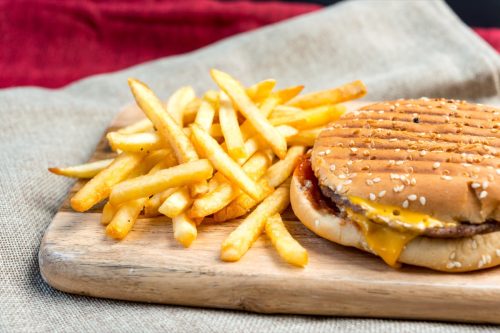4 Things You’re Eating That Could Be Making You Depressed

Depression is an extremely common and complex mental disorder with many potential causes—genetic, biological, environmental, behavioral, and psychological—but one possible trigger may be something as seemingly benign as what you’re eating. Scientific research has linked certain foods with an increased risk of depression.
“It’s not rocket science that healthy eating is associated with good health, but we rarely discuss the importance of healthy eating for the developing brain, arguably the most important organ in the body,” says psychiatrist Uma Naidoo, MD, who founded the first nutritional psychiatry service in the United States at Massachusetts General Hospital in Boston. “The foods we consume have a big influence on our mental health and cognitive function, due to the connection between our gut and our brain. These organs have been intimately related even before we were born; they develop from the same exact cells in the embryo.”
Naidoo knows food; she’s a professional chef and can whip up a healthy mac & cheese to die for (secret ingredient: cauliflower florets). Plus, she’s on the cutting edge of the relatively new field of nutritional psychiatry, serving as director of that service at Mass General. She’s also a faculty member of Harvard Medical School, and author of the book This is Your Brain on Food.
“Linked via the vagus nerve, which connects nerve endings in our gut to nerves in the brain, our digestive track and mind quite literally speak to each other,” says Naidoo. “More than 90 percent of the receptors for the neurotransmitter serotonin, which is responsible for mood and cognition, are located in the gut, highlighting just how powerful this food-mood connection is.”
Eating patterns high in healthy, wholesome foods are correlated with positive mental health, she says, while diets higher in processed, sugary foods are associated with symptoms of poor mental health, such as depression and anxiety. So, do your mental health a favor and stay away from the following foods, which are likely to dull your mood—and may even make you depressed.
READ THIS NEXT:Taking This Supplement Can Cut Your Pain in Half, Experts Say.
1
Sugar-sweetened beverages

Think about how your mood may suffer of you spooned 12 teaspoons of sugar into your mouth and swallowed. That’s how much you’re getting in a typical can of soda. “Consuming the refined sugars found in sodas triggers blood sugar spikes that can lead to significant mood swings and fatigue,” says Naidoo. And observational studies suggest an association between drinking sugar-sweetened beverages and mood disorders.
One analysis of studies involving more than 37,000 depression cases in the Journal of Affective Disorders found that when compared to people who didn’t drink soda, those who drank the equivalent of three cans of cola daily could have a 25 percent higher risk of developing depression.
READ THIS NEXT: Drinking This Popular Beverage Can Slash Your Bad Cholesterol, Experts Say.
2
Bacon, deli meat, and hot dogs

“Low-nutrient, highly processed foods, including cured meats, are often high in nitrates and chemical additives that create inflammation in both our body and brain,” says Naidoo, “and inflammation in the brain is a common culprit of poor mental health symptoms like anxiety.”
In one experiment, Johns Hopkins Medicine researchers put rats on a diet with added nitrates and found that the rodents showed mania-like hyperactivity after just a few weeks on the supplemented diet. Other studies suggest a possible connection between nitrates and mania in humans. While it doesn’t suggest cause and effect, a study by those same Johns Hopkins scientists noted that people hospitalized for an episode of mania had more than three times the odds of having eating nitrate-cured meats than people without a history of serious psychiatric disorder.
3
Refined grains

“I encourage patients to limit foods with a high glycemic index, such as white bread and white rice,” says Naidoo. Refined grains like these have had their fiber and much of their nutrition removed. “These foods promote inflammation and negatively affect the health of the gut microbiome, which hampers effective communication between the gut and brain. And mental health suffers,” she explains.
By contrast, eating fiber-rich whole grains improves blood sugar control and can help prevent Type 2 diabetes. According to the Centers for Disease Control and Prevention, people with diabetes are two to three times more likely to suffer from depression than people without diabetes. Research suggests that whole grains like oats, brown rice, 100 percent whole wheat, and bulgur, may help balance levels of feel-good, mood stabilizing neurotransmitters, such as tyrosine and serotonin.
For more health news sent directly to your inbox, sign up for our daily newsletter.
4
Fast food

Enjoying a hamburger and french fries once in a while is unlikely to sink you into clinical depression, but making a habit of eating fast food may. Fried foods and fast-food meals are often high in salt, saturated fats, refined sugars, and even trans fats, which can worsen anxiety and depression. One study, published in the journal Public Health Nutrition, revealed that people who regularly eat fast foods like hamburgers, sausage, and pizza, are 51 percent more likely to develop depression than people who rarely or never eat fast food.
“A daily diet of fast foods basically makes the bad gut bacterial thrive, and that triggers inflammation,” says Naidoo. “Targeting this inflammation through nutrition is becoming a means of improving symptoms of depression and anxiety, as well as preventing neurodegenerative diseases (like dementia and Alzheimer’s disease) and provides tangible ways for individuals to take power over their mental health.”
What’s one of the best ways to turn the tide against inflammation and support gut and brain health? Follow a Mediterranean-style diet rich in vegetables, fruits, olive oil, fish, and whole grains, which has been linked to lowering risk of developing depression, suggest Naidoo.